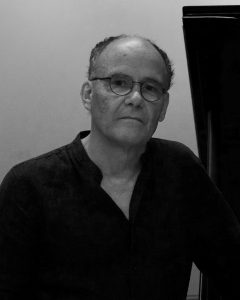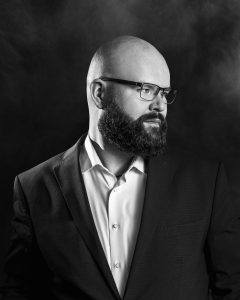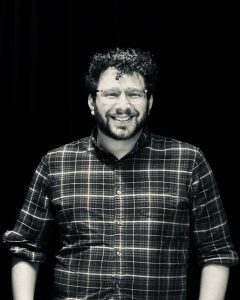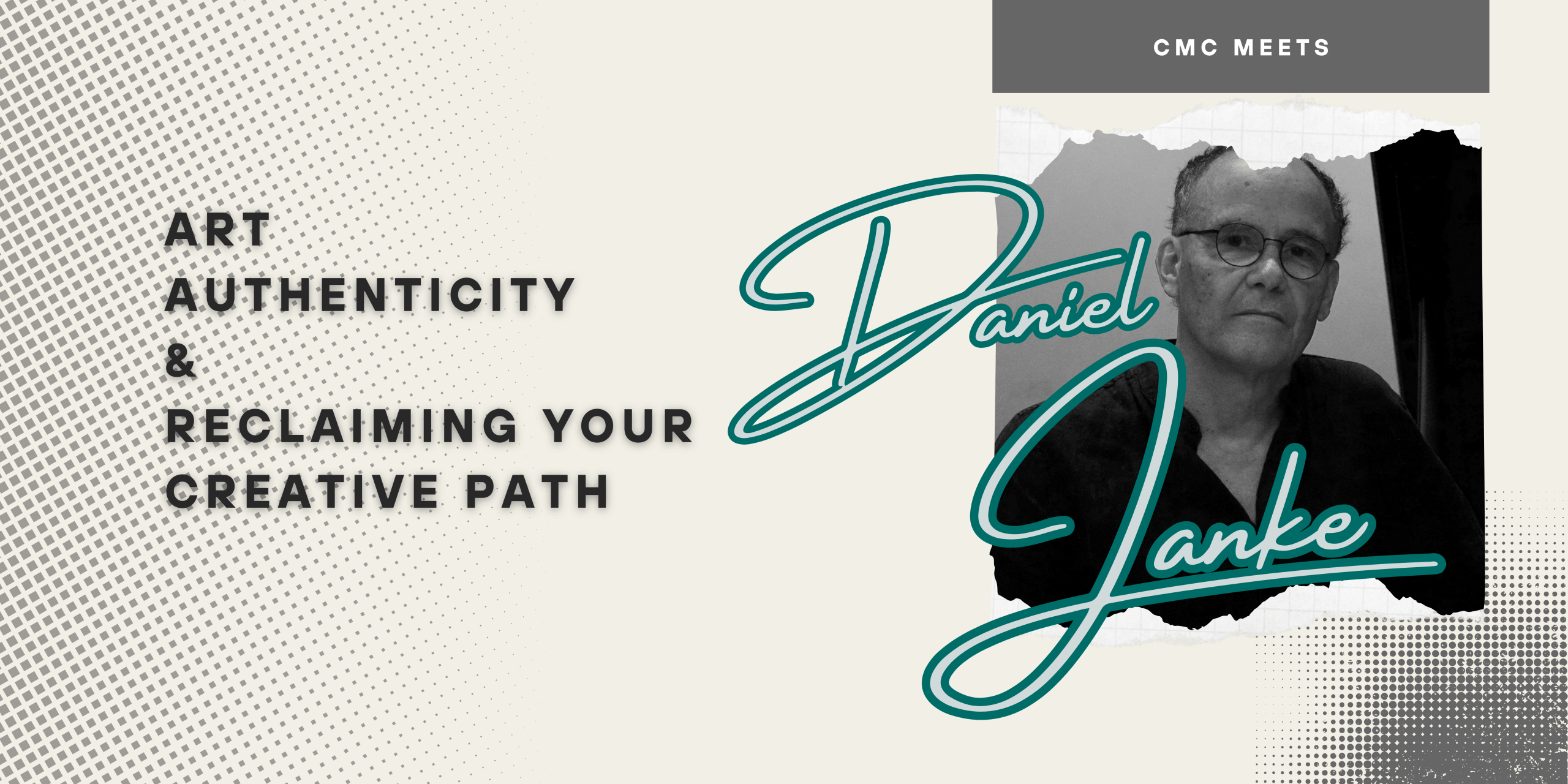“You’ve got to write the music you hear.” These powerful words from acclaimed Canadian composer Daniel Janke are the very embers that fuel the fire of artistic creation. Amidst a tour for Map of You, his new genre-blurring album—written by Janke and performed by classical pianist & soprano Rachel Fenlon—Janke sat down with Joël Blackshaw and Joseph Glaser. Their candid discussion cut deep into the nature of love, the industry’s systemic failures, and why unwavering artistic authenticity remains both the greatest challenge and the ultimate, invaluable reward for creators.
Joël Blackshaw: “With Map of You exploring such diverse facets of love, what do you hope listeners will discover about the map of their own hearts through listening to the album or witnessing the live performance?”
 Daniel Janke: “It started out with the existential question of whether or not we’d experienced love in our lives, and I think for many people, the first time you experience love in your life, it’s the love you feel from your parents, and it teaches you how to love, but are there people who didn’t experience parental love? Do they go through life, never experiencing love? What is the existential nature of love? That was the starting point, but I found that as soon as I tried to address that head on, it became too big, too on-the-nose and I found myself circling through parental love, erotic love, friendship, sisterly love, unrequited love, rejected love. So, this collection goes through and creates a little vignette on each of these. I wanted to create a musically resonant experience where somebody wants to listen to this collection of songs from the beginning to the end without interruption. If the meaning enters in, that’s a bonus.”
Daniel Janke: “It started out with the existential question of whether or not we’d experienced love in our lives, and I think for many people, the first time you experience love in your life, it’s the love you feel from your parents, and it teaches you how to love, but are there people who didn’t experience parental love? Do they go through life, never experiencing love? What is the existential nature of love? That was the starting point, but I found that as soon as I tried to address that head on, it became too big, too on-the-nose and I found myself circling through parental love, erotic love, friendship, sisterly love, unrequited love, rejected love. So, this collection goes through and creates a little vignette on each of these. I wanted to create a musically resonant experience where somebody wants to listen to this collection of songs from the beginning to the end without interruption. If the meaning enters in, that’s a bonus.”
 Joël: “You’ve mentioned Map of You originated from an opera in development called Elixir of Isis, about ageing, ageism, and eternal youth. For ambitious artistic projects, like a full opera or dramatic presentation, what are the greatest logistical and artistic hurdles to bringing them to fruition in Canada, and how do you envision pathways to overcoming them?”
Joël: “You’ve mentioned Map of You originated from an opera in development called Elixir of Isis, about ageing, ageism, and eternal youth. For ambitious artistic projects, like a full opera or dramatic presentation, what are the greatest logistical and artistic hurdles to bringing them to fruition in Canada, and how do you envision pathways to overcoming them?”
Daniel: “I envision it by going to Europe. I’ve got interest in Europe; I’m going back to France next year for a workshop in the Bourgogne region, and it’s a slow process. It’s too big, like you say, and Map of You kind of sprang out of it as a way of something that’s small, achievable, while the opera simmers along on the back burner. It started with a few songs that were rejected from the opera, and then it took on its own theme, and it was something I could deliver. And the opera continues on…”
Joël: “You’ve noted that Map of You sits at the boundary between art song and folk, embracing diverse musical influences. What prompted the blurring of the genres, and how do you feel this approach distinguishes the album from other contemporary music?”
Daniel: “I think it follows where I’ve been going as a composer; I write contemporary music, but I’m not really a hardcore modernist, so entering into the world of song for me is kind of an eye-opener. The last three or four years, starting with the opera and this project, I find I’m good at it, and I like writing songs—I like the hardball of the song genre—the smallness of it—and when I started looking into art song, I realized that there are all sorts—think about the traditions of Schubert or Schumann or Schoenberg—there are all sorts of collections of art songs, and each one has a different direction, but they’re united by theme stylistically. Map of You fits all those criteria and it’s united by all those things. The language is mostly tonal, but it’s polytonal, it’s modal, it changes key throughout. There is some atonal music, but it’s not serialism. It doesn’t make a rigorous effort to maintain atonality, so, in that way, it’s very loose, and I hear it very much as folk songs in my head.”
 Joseph Glaser: “There’s a quality to the music of restraint. They’re very economical, these songs, and I’m wondering if that was a conscious choice given the smallness, as you said, of the genre and limitations of a single performer, or whether that was just something you were interested in exploring.”
Joseph Glaser: “There’s a quality to the music of restraint. They’re very economical, these songs, and I’m wondering if that was a conscious choice given the smallness, as you said, of the genre and limitations of a single performer, or whether that was just something you were interested in exploring.”
Daniel: “I think the latter is mostly the case. I find that piano writing in general falls into a huge number of clichés, and I found the way to avoid a lot of those was to pare it down and leave more space for the voice and let the piano be more like a single line instrument in some cases. […] Some of the pieces are tricky to play with singing; rhythmically, there are juxtapositions that make it difficult. But it was a conscious choice to find a new piano language: to keep it simple, and then go from there and build it up again.”
Joseph: “It reminds me of the Blaise Pascal quote, ‘I have made this letter longer because I lacked the time to make it shorter.’ In some ways, it’s harder to write with brevity and economy.”
Daniel: “It’s true, and for me, it took trust in the singer and realizing her abilities as we went along; that was exactly the right approach. Just let her do it. Don’t get in her way, and the writing got better as we went through the process.”
Joël: “The album’s approach seemed a perfect fit for Rachel and her unique performance practice as a singer and pianist. Can you describe the collaborative process with Rachel and how it began and how it influenced the final sound of the album?”
Daniel: “It’s very professional, our relationship—we’re not particularly friends; we haven’t spent much time together because Rachel’s really busy. She lives in Berlin—she’s gone a lot. I’m in my studio. About two and a half years ago, I approached her with a couple songs and the idea of doing an album. I was interested in the idea of a singer who could accompany themselves. That’s Rachel’s niche, but her interpretive process is her own. I didn’t get too involved in it. She has her own inner discipline in the way she works. I just needed to get out of the way.”
Joseph: “Did she bring out anything in the sounds that you were surprised by? Things that you didn’t know were there, that subsequently she found?”
Daniel: “Absolutely. A lot of it, I just didn’t talk about, because I didn’t want to get in her head, but at the same time, none of the scores changed at all; they’re all exactly the same. […] And this was fantastic. She has a lot to say, but she takes interpretation seriously, as well.”
Joël: “What other projects or collaborations are on the horizon for you?”
Daniel: “This really cool project for orchestra and soprano that I just started is called Speed of Lichen. It’s a bit of a play on words, since lichens grow for thousands of years. They’re beautiful. […] I am really psyched about it because it uses the genus, the name, the species of all these different lichens as the text, and, since it’s Latin text, it sounds liturgical. […] I’m also playing in a contemporary jazz trio and we’re touring; and I have my daughter’s band coming in the studio here for an album next month. So it’s a diverse musical life.”
Joël: “What advice would you offer to composers in the early stages of their career who are looking to forge a successful and multifaceted career in today’s music industry?”
Daniel: “I’ve never been focused on a career, and it’s been to my detriment. When I went to music school, there was no career guidance or counselling. It was hardcore theory and materialist dogma. There was no career planning, and in many ways, I think it’s a dangerous way to go. Ultimately, you’ve got to write the music you hear. And if you can’t forge your career out of that, it doesn’t necessarily mean it’s your fault. In many cases, people shouldn’t pursue music careers; they should just pursue music, and see if a career comes out of it. But I don’t know how trendy that is anymore because the industry is geared towards the number of likes and the social media presence and the success in numbers through the industry.”
Joël: “What do you view as the antithesis of such an industry that’s focused on hard metrics and success in terms of numbers only?”
Daniel: “I still believe that your work can be merit-based. We live in a really interesting time—there are lots of opportunities now in social pathways for people that didn’t have opportunities. […] You have to know who you are and what you want to do and trust that it’s worth doing in your life.”
Joël: “Your career is remarkably diverse, spanning composing for orchestras and choirs, film scoring, and performing as a pianist. Such things require a good deal of collaboration. What advice would you give to a composer or performer who feels isolated and desires to forge new collaborations?”
Daniel: “I love collaborating, but I also spend a lot of time on my own, writing, and collaborations are often built over many years. Once you establish a comfort zone and a trust with someone, whether they’re a filmmaker or a performer, collaborations just happen. Ultimately, it comes down to the merit of work and what kind of work ethic you apply to it. I think collaborating is great—music is a social activity, and I’ve always collaborated on some level. But I’ve also always run away to my own studio when I need to just work.”
Stream or buy Daniel Janke and Rachel Fenlon’s “Map of You” from Centrediscs

